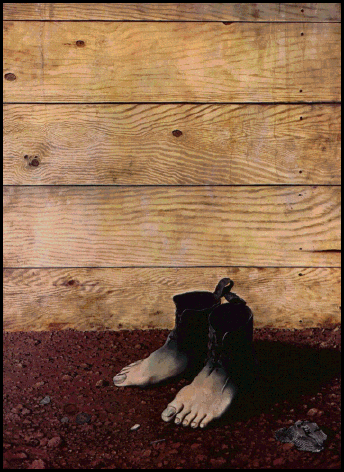
The skipper offered to sign him on as an ordinary seaman. "You're a sailor now," he said one night in Stubbekøbing, as Albert helped him pull off his boots. "You can fix a flying jib and a topsail. You know the compass and you can sail by the wind and run before it."
But instead, Albert did as his father before him: he went to Hamburg to find a ship that would take him farther out into the world.
Before he left, he went up into the loft at home. Here, among the sacks of potatoes and grain, sat the sea boots his father, Laurids, had abandoned when he left home for the last time. That had been an omen: they'd realized it later. In stormy weather, when the roof shook and the gable quaked, Albert's mother thought she could hear the empty boots stomping about up there on their own. But no one ever dared go up and look.
Rasmus and Esben had never touched the boots. Out of fear, perhaps --- or simply because they'd never matched their father's considerable height and their feet weren't big enough. Only Albert took after Laurids.
He came down the stairs holding the boots, their wooden soles still scorched from Laurid's famous trip to Heaven.
"What are you doing with those?" he mother asked. Her eyes were anxious, as though she both hoped and dreaded he'd be throwing them out.
"I want to wear them," said Albert.
"You musn't!"
Her hand flew to her mouth. Did she fear that bad luck would follow him if he put them on? Was it superstition or premonition? It was hard to tell. There was a mother's worry, certainly. Perhaps she sensed that this time he would be going far, and would be gone many years. Which for her was the same as death.
"I'm going to" was all he said.
He had to stoop now to walk through the doorway, and his shoulders filled it.
"You promised my father to make them like new again," he said when he arrived at the workshop of Mr. Jakobsen, the cobbler, in Kongegade.
"That was twelve years ago. You've got a good memory," Jakobsen said. "But a promise is a promise. You can pick them up on Saturday."
Albert worked seven months as an ordinary seaman on board a Hamburg brig that sailed to the West Indies. He saw palm beaches and flying fish. He saw people whose skin was black and brown. He saw the cowed look in their eyes and their bowed backs and needed no one to tell him that they knew the thrashing rope. Men like Isager weren't schoolteachers here. They were rulers of these sunny isles, including those where Danish was spoken, and they all ruled by the rope.
He drank coconut milk and ate alligator meat, which tasted like chicken. He shat seven kinds of shit, but none of it was beaten out of him. He'd escaped.
"It never stops" was what Hans Jørgen had said. But it does. When you become an able seaman, when you're seventeen years old and big and strong enough to defend yourself, then it stops. Albert watched the black and brown men who loaded and unloaded the brig. They didn't have ownership of themselves, and they were forever in thrall to the rope. He wondered what would have happened if he'd been born one of them, to be flayed all the way to the grave. Would he have broken eventually? Or would he have looked for someone he could pass his humiliation on to, just so that he could feel vaguely human? Would he have found a dog to kill, a house to burn down, a woman to drive mad?
When we met every winter in Marstal, we sized up one another. We were becoming men. Our eyes seemed deeper-set, and our cheekbones jutted: it was as if the beatings we'd suffered over time had led to something permanent. Our hands had grown big, our palms were tough, our biceps bulged, and sinews and veins fought for space on our forearms beneath the blue spider web of tattoos. We'd grown bigger and stronger, to spite the rope.
When the bosun yelled "All hands up anchor!" and "Heave my hearties, heave hard!" he heard his father's voice, and felt his papa tru close by him once more. He remember the American words that had so irritated his mother and so delighted him and his brothers.
"Hanggre," he said in the mess. They shook their heads and laughed at him.
"Monki," they said.
It was a good while before he realized that his papa tru hadn't been speaking American after all, but Pidgin, the Chinese and Kanak version of English. That was what his papa tru had taught him. Pidgin English, the language of cannibals.
[Excerpt from "We the Drowned" by Carsten Jensen. (Translated from the Danish by Charlotte Barslund with Emma Ryder.) Houghton Mifflin Harcourt, 2010]
Carsten Jensen
Translated from the Danish by
Charlotte Barslund and Emma Ryder
©2010 Houghton Mifflin Harcourt